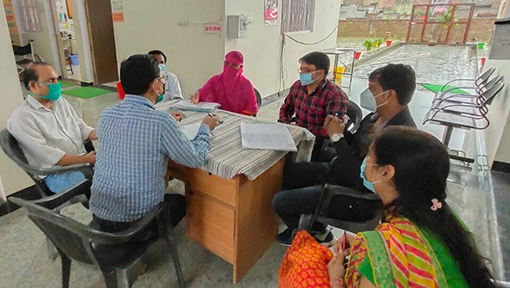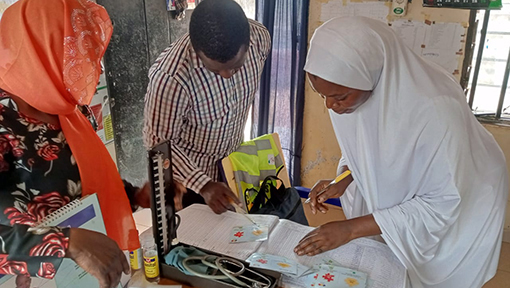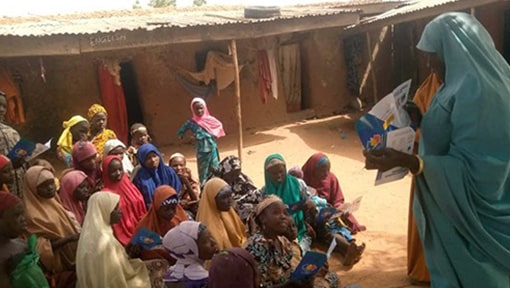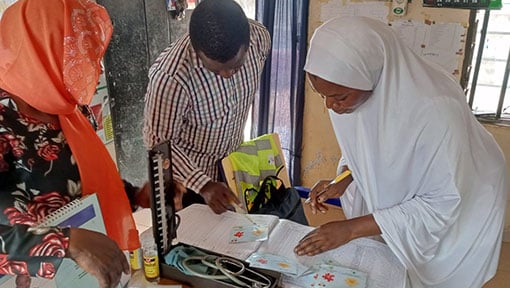TCIHC Helps Local Government Address Staffing Shortages During COVID-19 to Ensure Family Planning Service Delivery
Contributors: Dharmendra Singh, Dharmendra Tripathi and Parul Saxena

QI committee meeting in Mathura.
As a result of the COVID-19 pandemic, city governments are faced with numerous management and operational challenges in meeting the family planning needs of the urban poor. These challenges are compounded by shortages of service providers in urban primary health centers (UPHCs) as several staff were moved to district hospitals for COVID care duties and a large percentage of providers were infected with coronavirus and/or quarantined due to exposure. In cities supported by The Challenge Initiative for Healthy Cities (TCIHC), such as Shahjahanpur and Mathura, city governments have resolved these operational challenges through the use of TCIHC’s high-impact approaches to ensure family planning service delivery resumed during the COVID pandemic.
Shahjahanpur’s city government used the city coordination committee (CCC), a convergence platform, to address a lack of service providers at UPHCs, while the city of Mathura harnessed the capabilities of Quality Improvement (QI) committees at UPHCs to resolve issues arising from staffing shortages. Both CCC and QI are part of TCIHC’s high-impact approaches: Convergence of Services and Quality Assurance, respectively.
Dr. Laxman Singh, Additional Chief Medical Officer (ACMO) and District Immunization Officer (DIO) of Shahjahanpur shared how he used the CCC approach to address staffing shortages and reopen the UPHCs of the city:
COVID-19 pandemic adversely affected family planning services in Shahjahanpur. All 10 UPHCs staff were engaged in COVID-19 care and management duties [as a result of government mandate’s]; hence, all UPHCs were closed. This affected provisioning of all health services, including family planning services. However, Accredited Social Health Activists (ASHAs) were distributing oral contraceptive pills (OCPs) and condoms in the community during their COVID-19 survey, but clinical family planning services had almost stopped due to unavailability of service providers and this was the biggest concern for us. I shared this concern with TCIHC who coached me to refer to the ‘Convergence’ approach. I discussed this with my team, including the urban nodal officer and urban health coordinator, and we organized a CCC meeting in September 2020. In that meeting, Nagar Swasthya Adhikari [the municipal officer of health] raised the same concern of non-availability of service providers at the UPHCs. Thus, this committee decided to shift the task of service delivery to trained Auxiliary Nurse Midwives (ANMs). It was decided that, except for immunization day, ANMs will provide health services in UPHCs, including IUCD and Antara services, in routine days and during Antral diwas [Fixed-day static services for spacing methods]. Soon after the CCC meeting, we developed a plan and ANMs were allotted to UPHCs. UPHC staff involved in COVID-19 duty were, however, directed to be present at their respective UPHCs on Antral diwas. In this manner, we were able to reopen all 10 UPHCs and provided method choices to family planning clients. The convergence tool of TCIHC helped us in coping with this challenging situation during the pandemic.”
Punish Kumar, the Urban Health Coordinator of Shahjahanpur, shared how the government of Shahjahanpur plans to continue implementing this approach since they have witnessed its success, especially during these trying times:
With the technical support of TCIHC, we initiated CCC meetings in Shahjahanpur. So far, this collaborative platform has helped NUHM [National Urban Health Mission] department to collectively work and plan with all urban stakeholders and resolve issues pertaining to urban family planning. During the challenging time of COVID-19, the CCC platform helped us to restart family planning services, including Antara and IUCD services in UPHCs, to meet the family planning needs of the urban poor. We are confident by utilizing this platform we can manage any disaster situation in future also.”
Dealing with the same challenge – a shortage of providers at UPHCs to continue family planning services – the city of Mathura encouraged UPHCs to conduct QI committee meetings, where UPHC staff meet and identify solutions to challenges. Jeetendra Singh, a Pharmacist at the Laxmi Nagar UPHC in Mathura and a QI committee member, shared how this meeting played an instrumental role in overcoming this challenge:
The staff nurse of our UPHC was engaged in COVID duty because of which family planning service provision was completely stopped. Many IUCD and Antara clients who visited Laxmi Nagar UPHC on Antral diwas had to return without availing services. This issue was raised in a QI committee meeting. This concern was realized prior to this meeting also and was discussed with TCIHC and they had coached us about the guideline issued by the state government for reinitiating Antral diwas, which stated that in the absence of service providers, trained ANMs can provide services on Antral diwas. The coaching I received helped me present this solution at the QI meeting. This recommendation was accepted, and I felt proud that I could give this suggestion based on TCIHC’s coaching. Soon, a government order was issued and a trained ANM was assigned to Laxmi Nagar UPHC and, with her support, we were able to reinitiate family planning services, including long-acting reversible methods during Antral diwas. This step has ensured that none of the clients return home without availing family planning services at least on FDS/Antral diwas days.”
The Antral diwas state directive was an outcome of rigorous advocacy efforts of TCIHC’s Uttar Pradesh (UP) state team and was issued for all 75 districts, including both urban and rural, to ensure family planning services resume and do not lose momentum gained in addressing the unmet need for family planning in UP.
Dr. Man Pal Singh, Nodal Officer of NUHM of Mathura, highlighted the contribution of the QI committee meeting not only in resolving this issue but in addressing other quality-related issues and gaps:
Many times, we came to know about issues and challenges at UPHCs through QI committee meetings. TCIHC played a major role in institutionalization of QI committee meeting concept at the UPHC level. We started QI committee formation and meeting with the technical support of TCIHC. These meeting help UPHC staff to periodically discuss quality related issues, gaps and find solutions. Laxmi Nagar UPHC staff raised the issue of staff crunch in QI committee meeting, which was hindering family planning services. They then proposed a solution, citing the Antral diwas directive to assign trained ANMs on FDS days at UPHCs. We immediately referred to the mentioned state directive and decided to assign trained ANMs at UPHCs. This decision helped us to resolve this similar issue for all seven UPHCs [across Mathura]. We prepared duty roster of each ANM and, on rotation basis, ANMs started providing family planning services, including IUCD and Antara services in Antral diwas. We also decided that if Antral diwas falls on a holiday then the next working day in the same week is allocated for the Antral diwas. This way we are able to fulfil the family planning needs of the urban poor during the pandemic, as once again they can get family planning services of their choice from their nearest UPHC. Apart from this, I regularly review data with my Data Cum Account Assistance who has been coached on data management by TCIHC and as a result, I am able to see the progress made by all the UPHCs on family planning indicators and other services as well.”
Archana Gaur, ANM, Laxmi Nagar UPHC also shared her experience taking on more of a role in family planning service provision during the COVID pandemic:
I am providing family planning services in Laxmi Nagar UPHC. I was given this task because I am trained in IUCD insertion and dispensing Antara injectable. COVID-19 has affected everyone’s life, especially the poor who are facing many challenges. I am happy that during the pandemic I am able to serve poor women who need IUCD and Antara services.”
After the government-imposed lockdown, these evidence-based approaches have helped many city governments in UP to reactivate UPHCs to deliver accessible, quality and assured family planning services to the urban poor. However, city governments continue to face challenges related to demand generation as client visits for clinical services remain low as people are worried about becoming exposed to COVID-19 and refraining from leaving their homes unless absolutely essential.






